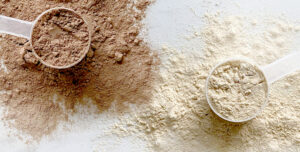The COVID-19 pandemic has changed the way that many of us live our daily lives. One survey found that the overwhelming majority of Americans (89%) mentioned at least one negative change in their own lives since the pandemic began. However, 67% of Americans surveyed also mentioned at least one negative and one positive change. So, while the COVID-19 pandemic has created a wide range of difficulties for many people, there also have been some unexpected silver linings.
One of those silver linings is that 62% of Americans have made significant lifestyle changes since the start of the COVID-19 pandemic in an effort to get healthier and stay healthy. The pandemic has also increased interest in immunity and sparked innovation. In fact, immunity is one of the most searched topics at this time. And a recent survey found that 1 in 3 global consumers were more concerned about immune health in 2020 than in 2019.
So, for any of you wondering: What is immunity? We’ll answer that question, explain how your immune system works, and highlight the ways that you can support a healthy immune system.
What Is Immunity?
Immunity refers to your body’s ability to prevent the invasion of pathogens, which are foreign disease-causing substances such as bacteria, viruses, parasites, or fungi. Your immune response is how your body recognizes and defends itself against these disease-causing substances.
Immunity to a disease is achieved through the presence of antibodies to that disease in your system. Antibodies are proteins produced by your body to neutralize (or destroy) toxins or disease-carrying organisms.
What Is The Immune System?
Your immune system protects your body from possibly harmful substances by recognizing and responding to antigens, which are substances (usually proteins) on the surface of cells, viruses, fungi, or bacteria. Made up of various organs, cells, and proteins, your immune system is what attacks germs and helps keep you healthy. Without an immune system, you’d have no way to fight harmful things that enter your body from the outside or harmful changes that occur inside your body.
The primary components of your immune system are your tonsils and thymus (responsible for producing antibodies), lymphatic system, bone marrow, white blood cells that protect your body from infection, and your spleen, which filters your blood by removing old or damaged cells or platelets. When your immune system is running smoothly, you won’t even notice that it’s there. But if it stops working properly because it’s weak or can’t fight aggressive germs, you’ll get sick.
How Does The Immune System Work?
The three main tasks of your body’s immune system are to:
- Fight disease-causing germs (pathogens) like bacteria, viruses, parasites, or fungi, and to remove them from your body.
- To recognize and neutralize harmful substances from the environment.
- To fight disease-causing changes in your body, such as cancer cells.
When your body senses foreign substances or antigens, your immune system works to recognize the antigens and then get rid of them. Lymphocytes known as B and T cells are key cells in your immune system that help destroy invaders within your lymphatic system. B lymphocytes are triggered to make antibodies, which are also called immunoglobulins. These proteins then lock onto specific antigens.
Once your body has come into contact with a disease-causing germ for the first time, it usually stores information about the germ and how to fight it. Then, if your body comes into contact with the germ again, it recognizes the germ quickly and can start fighting it faster.
Antibodies usually stay in your body in case you have to fight the same germ again. That’s why people who get sick with a disease like chicken pox usually won’t get sick from it another time. And while everyone’s immune system is different, your immune system generally will become stronger during adulthood since you will have been exposed to more pathogens and developed more immunity by this time. That’s why teens and adults tend to get sick less often than children.
What Are The Types Of Immunity?
There three types of immunity that humans have are innate immunity, passive immunity, and adaptive (acquired) immunity.
Innate Immunity
Innate (non-specific) immunity is the general protection that you’re born with. It involves barriers that keep harmful materials from entering your body. These physical barriers and defense mechanisms form the first line of defense in your immune response.
Some examples of innate immunity include your cough reflex, stomach acid that destroys pathogens, skin that keeps out the majority of pathogens, body hair, mucus that traps bacteria and small particles, and enzymes in your sweat and tears that help to create antibacterial compounds. Even though your immune system doesn’t know exactly what kind of antigen is invading your body, it can respond quickly to defend against any pathogen. And if an antigen gets past your innate immunity barriers, it will be attacked and destroyed by other parts of your immune system.
Passive Immunity
Passive immunity is provided when a person is given antibodies to a disease rather than producing them through his or her own immune system. Infants have passive immunity because they are born with antibodies that are transferred through the placenta from their mother. As a result, a full-term infant will have the same antibodies as his or her mother. These antibodies will protect the infant from certain diseases, and act to defend against specific antigens. However, these antibodies disappear between 6 months and 12 months since the body has not produced the antibodies.
Adaptive (Acquired) Immunity
The adaptive (specific) immune system makes antibodies and uses them to specifically fight certain germs that the body has previously come into contact with. This is also known as an ‘acquired’ or specific immune response. And since the adaptive immune system is constantly learning and adapting, your body can also fight bacteria or viruses that change over time. We develop adaptive immunity when we’re exposed to diseases or when we’re immunized against them with vaccines.
Active vs. Passive Immunity
Active immunity results when exposure to a disease organism triggers the immune system to produce antibodies to that disease. With active immunity, exposure to the disease organism can occur through infection with the actual disease, which results in natural immunity, or the introduction of a killed or weakened form of the disease organism through vaccination, which results in vaccine-induced immunity. If an immune person comes into contact with that disease in the future, their immune system will recognize it and produce the antibodies needed to fight it right away.
Meanwhile, passive immunity results when a person is given someone else’s antibodies. While a newborn baby acquires (natural) passive immunity from its mother, a person can also get (artificial) passive immunity through antibody-containing blood products such as immune globulin, which may be given when immediate protection from a specific disease is needed.
The protection offered by passive immunization is short-lived, usually lasting only a few weeks or months, but it helps to protect people immediately, which is the big advantage to passive immunity. On the other hand, active immunity is long-lasting, and sometimes even lifelong.
Nutrition And Immunity/
Eating enough nutrients as part of a varied diet is required for the health and function of all your cells, including your immune cells. While it’s unlikely that individual foods offer special protection, certain dietary patterns may better prepare your body.
Some nutrients that emerging research has identified as helping to support a normal functioning immune system are vitamin C and zinc.
So, in order to support a healthy immune system, it’s important to eat a balanced diet with whole fruits, vegetables, lean proteins, whole grains, and plenty of water, perform moderate regular exercise, get enough quality sleep every night, do your best to manage stress, and wash your hands throughout the day, especially when you come in from outdoors, before and after preparing and eating food, and after using the restroom, coughing, or blowing your nose.
*The links used in this article are being provided as a convenience and for informational purposes only; they do not constitute an endorsement or an approval by Iovate Health Sciences International Inc. or any of its affiliates (“Iovate”) of any of the products, services or opinions of the corporation or organization or individual. Iovate bears no responsibility for the accuracy, legality or content of the external site or for that of subsequent links. Contact the external site for answers to questions regarding its content.







